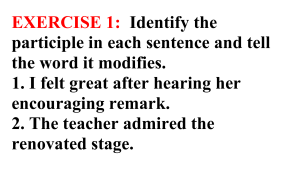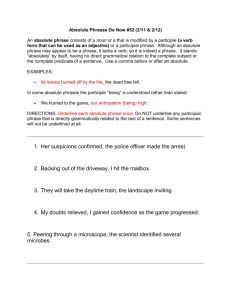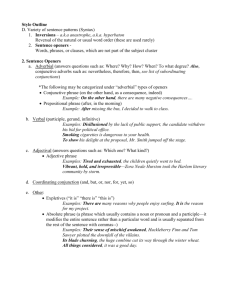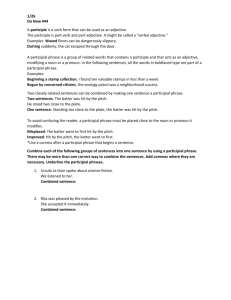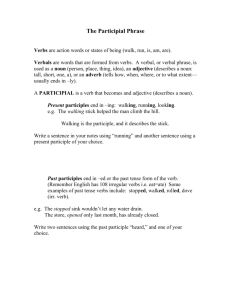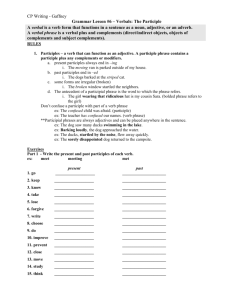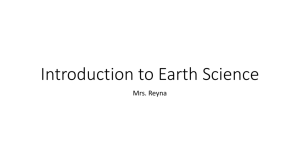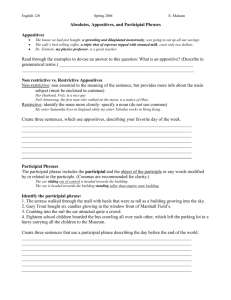Participles & Participial Phrases
advertisement
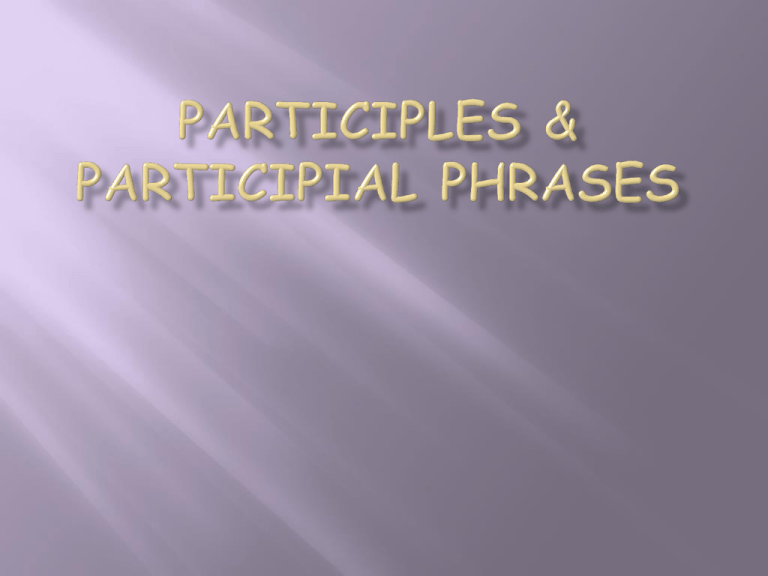
Ex: The waving campers boarded the bus. Waving, the campers boarded the bus. [In these sentences, waving, like the verb wave, expresses action; like an adjective, it modifies the noun campers.] We could hear the wind howling. [Here howling expresses action, like a verb; it also modifies the noun wind. There are 3 forms of participles: Kinds of participles Present Participle Forms Ends in –ing Examples I took a fishing pole. The winding trail descended. Past Participle Usually ends in –ed; sometimes –en or another irregular ending. We saw abandoned mines. Watch out for that fallen branch. Perfect Participle Includes having or having been before a past participle Having eaten, I moved on. Having been warned, I did not litter the park. Functioning as a Verb Functioning as a Participle She pitched the tent. The pitched tent was blown over. That river is flowing north through the park. The flowing river is deep. A participial phrase is a phrase containing a participle and any complements or modifiers it may have. The participle introduces the phrase, and the entire phrase acts as an adjective to modify a noun or a pronoun. EX: Nodding his head, the defendant acknowledged his guilt. Disturbed by his letter, she telephoned him. A participial phrase that is nonessential to the basic meaning of a sentence is set off by commas or other forms of punctuation. One that is essential is not enclosed by punctuation. Nonessential Participial Phrase Yellowstone’s springs, running with hot water, spew steam. Essential Participial Phrase The springs running with hot water spew steam. Number your paper 1 to 8. List the participial phrase found in each sentence and the word it modifies. 1. Staking her reputation on her success, Junko Tabei climbed Mt. Everest, hoping to reach the top in May. 2. Delighted by penicillin’s discovery, Fleming duplicated his experiments with Florey. 3. Their procedure, arrived at with such great care and effort, made their reputation. 4. Nellie Melba, thrilled by her successful career, retired repeatedly. 5. Delayed by wind and rain, the Spanish Armada arrived too late. 6. Drumming his wings wildly, the male pheasant tries to attract the females attention. 7. The male pheasant, once firmly convinced of the female’s interest, begins to accelerate the drumbeats expressing his excitement. 8. Flamingoes, stretching their wings and bowing, perform an elaborate courtship dance, a spectacular sight in nature. 1. Staking her reputation on her success modifies Juniko Tabei 2. Delighted by penicillin’s discovery, Fleming 3. arrived at with such great care and effort modifies procedure 4. thrilled by her successful career, modifies Nellie Melba 5. Delayed by wind and rain, modifies the Spanish Armada. 6. Drumming his wings wildly, male pheasant 7. once firmly convinced of the female’s interest, male pheasant 8. stretching their wings and bowing Flamingoes
